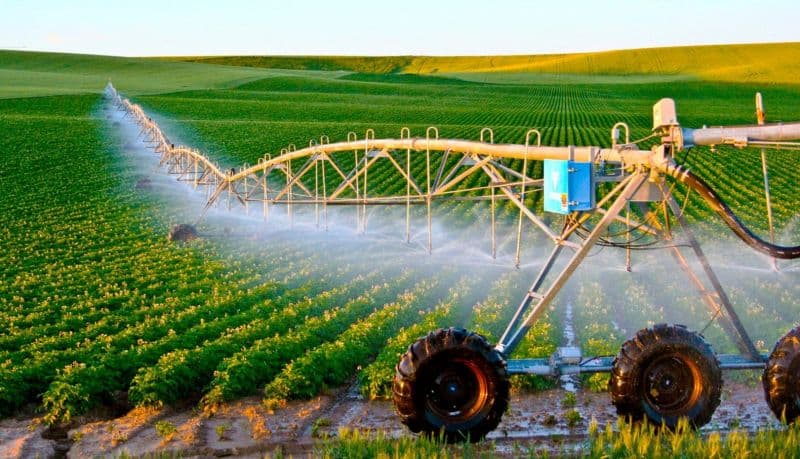
The law aims to increase the area of land on which hydrotechnical reclamation is applied and to reduce the cost of irrigating land.
Today, May 6, President of Ukraine Volodymyr Zelenskyi signed the Law of Ukraine "On Water Users’ Organizations and Stimulation of Hydrotechnical Land Reclamation." This is a revolutionary law for Ukraine, which has been worked on for more than two years by the UAC’s experts and the USAID Agricultural and Rural Development Program - AGRO.
The main tasks to be solved by this Law are:
- creation of a legal basis for the establishment and operation of Water Users’ Organizations, as a separate organizational and legal form of association of farmers who use water for land reclamation (hereinafter - WUO);
- transfer of management functions of reclamation infrastructure facilities to some WUOs (low-level infrastructure);
- creation of legal mechanisms for investing in the existing reclamation infrastructure and construction of new one (both within WUOs and not within ones).
To achieve these tasks, the Law provides: first of all, amendments to legislation that will create the preconditions for the maintenance of water users reclamation infrastructure and attract investment in it, namely:
- separation of the reclamation network as a separate component of the reclamation system, which includes a set of technologically related facilities of engineering infrastructure that provides intake or discharge of water from/at the point of separation for the needs of water users;
- inclusion in the State Land Cadastre of information on the reclamation network, its individual components and land plots (land massifs), reclamation of which the network can provide;
- inclusion in the immovable property real rights register information of rights to the reclamation network and its individual components.
Secondly, the bill defines the legal status of WUOs, regulates the procedure for the creation and acquisition of WUO rights to reclamation infrastructure.
Thirdly, the bill stipulates the obligation of the customer to build a reclamation network before the start of its construction to agree provision of water intake conditions, delivery and disposal services, including the pricing mechanism with the owners of land plots owned by at least two thirds of land plots.
Fourthly, the bill contains provisions aimed at simplifying administrative procedures for the construction and operation of reclamation networks.
Fifthly, it is proposed to allow the privatization of pumping stations that have not been used for at least ten years and for which no WUO has applied for ownership of the reclamation network facilities within two years after the adoption of the law and didn’t apply for the ownership of the reclamation network, which includes such a pumping station.
Sixthly, when adopting the main solutions in WUOs, it is proposed to equalize the level of influence of both large and small land users - members of WUOs in the implementation of key decisions in WUOs by introducing the so-called principle of voting "two keys". Such a voting model simultaneously implies the need to obtain a majority of votes of all WUO members from their number (main votes) and a majority of votes calculated from the area of irrigated land plots (additional votes).
Expert of an advisory center “Smart Country” Ruslan Kalnytskyi comments on the adoption of the new law:
"I emphasize that the law on WUOs will in no way deprive small agricultural producers of access to water. Trunk canals are channels of state importance, and therefore, according to the provisions of the law, they cannot be transferred to anyone and remain in state ownership. The same applies to inter-farm infrastructure, which will be transferred not to agricultural producers, but to water users’ organizations, members of which may be all interested landowners/land users, within the WUOs’ territory, regardless of plots’ size. Also, WOUs cannot dispose of the received facilities, but only operates them, and in case of its termination, is obliged to return them to the state ownership"
In addition, this law provides all water users, regardless of the area of their irrigated land, the opportunity to take an active part in the maintenance and development of reclamation systems, certain fees for water supply for irrigation, in contrast to the current regulation, when the opinion of real water users is not taken into account by government agencies and organizations that maintain reclamation facilities, when determining the size of the relevant tariff.
"Also, the introduction of the so-called "model of two keys" in calculating the number of votes for decision-making at the general meeting makes impossible risks of large water users making individual decisions on the management of the organization, ignoring the views of other members of the organization, including small water users. The model is the most optimal among other alternative ones, as it makes it impossible for both "majority" water users to make decisions and conspire a large number of ”small” water users and disregard the interests of "majority" water users, and, as a result, will require consensus between large and small water users making any decision on the WUO management” said Ruslan Kalnytsky.
For reference: Ukraine has about 40,5 million hectares of land suitable for agriculture, of which 2,2 million hectares are formally classified as irrigated ones (including occupied territories). Instead, according to the Reform Support Office at the Ministry of Agrarian Policy and Food of Ukraine, 18,7 million hectares of arable land in Ukraine needed constant irrigation and 4.8 million hectares - periodic irrigation. Given climate change, the area of dry and very dry arable land that will need irrigation will only increase in future.
Friday, 6 May 2022